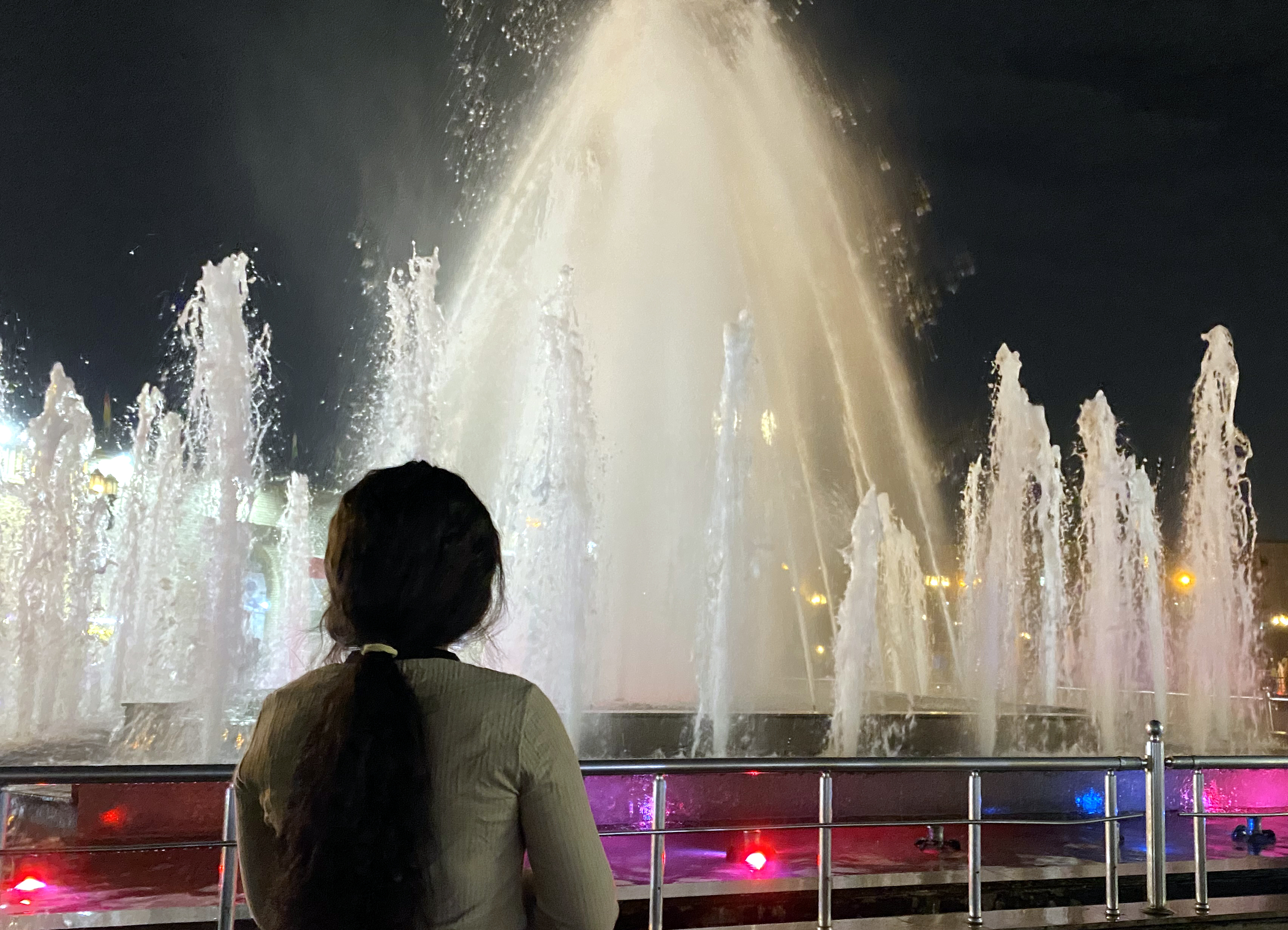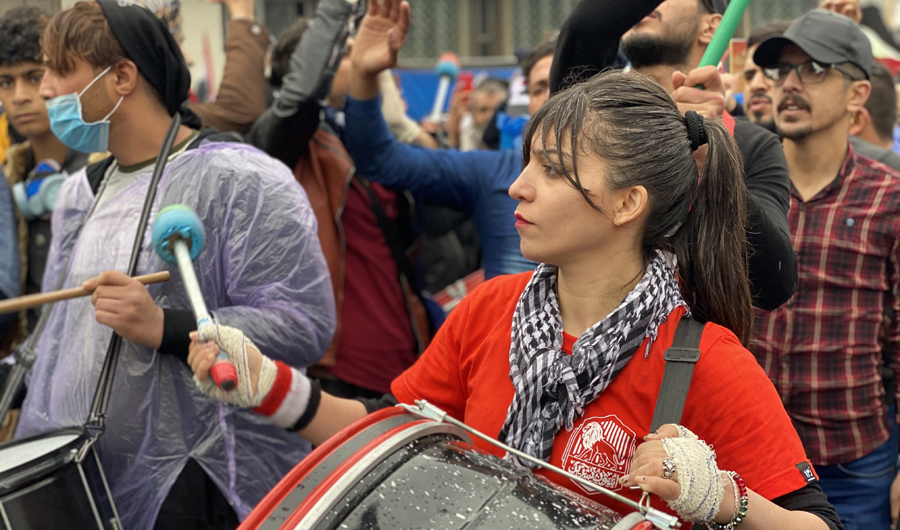“We are in a deep conversation about the gains of the October revolution; we ask ourselves what we have changed and what we must do,” said Sameer Ahmad, one of the organizers of the protests in Baghdad. The main question for them is that after hundreds were killed, thousands wounded and many kidnapped, why did the “revolution” end up as it is?
The question resonates among many activists and organizers of the protests in Baghdad and other provinces in central and southern Iraq, which started in October 2019 and lasted 13 months.
Many of those activists, like Sameer Ahmad, have escaped death and fled to the Kurdistan Region, where they live far away from their family and friends. They have been subjected to death threats, kidnappings, torture and humiliation. They keep asking themselves if their “revolution” is over.
Escaping Death
27-year-old Sameer Ahmad is one of the protest organizers from Baghdad. He participated in the protest from day one, 1 October 2019, until he was kidnapped in February 2020. He says he barely escaped death.
Sameer Ahmad is a pseudonym. He doesn’t want to use his real name because he still fears for his life. While having dinner in Baghdad’s Karrada neighbourhood with one of his friends on 22 February 2020 when three security cars stop and a number of armed men step out of them to kidnap them both.
“Some of them had their faces covered. They pushed me into one of the cars and my friend into another,” Sameer said, “They blindfolded me and pushed me down, and I no longer was aware what was happening to my friend. The car drove about an hour to and an hour and a half. They took me out somewhere and locked me up in a room without removing the blindfold.”
“I wasn’t aware if it was day of night. They would bring me a meal or two each day, which consisted only of water and potatoes. Their treatment was very harsh. They would constantly interrogate me under torture; they were trying to make me say whatever they wanted.”
They would constantly interrogate me under torture; they were trying to make say whatever they wanted
Sameer says they kept him blindfolded and his hands tied up. “They would insult my family members and my male and female friends on Tahrir Square. It seemed they had been watching me closely. They knew a lot about me and my movements. It was as if they had been inside my tent on Tahrir Square.”
Sameer says he was forced under torture to say that he was financially assisted by the American and German embassies. “The interrogations were being filmed. At the start of an interrogation session, I heard them say that the cameras were not ready.”
“Beside the American and German embassies, they wanted me to name some famous Iraqi politicians who supposedly have supported us.”
Suring his kidnapping, Sameer didn’t know of the fate of his friend. But during those three days, part of the demands of their fellow demonstrators was his and his friend’s release.
“The place where I was locked up was very quiet. I didn’t feel like there were other detainees.”
On the night of 25 February, after 72 hours of being locked up, Sameer was taken from the room and put into a car while still blindfolded.
“I was feeling that my death was close. I had a very awful feeling. Their treatment and the sound of their rifles being cocked made me feel like I was getting killed,” tearful, Sameer recalled to KirkukNow in one of Kurdistan Region’s cities about a month ago. “We were asking for a country where people’s dignity is preserved and to be free from the militias.”
The car drives for the same amount of time as the night he was taken when suddenly he hears one of the men shout “stop here.”
“They took me out of the car, untied my hands and put a gun to my head. I was telling myself that this is the last moment of my life. The armed man said, ‘For 10 minutes, you will not move from here, and you will not remove your blindfold. They slammed the car door and drove away after that.”
They took me out of the car, untied my hands and put a gun to my head. I was telling myself that this is the last moment of my life
Before being able to remove the blindfold, Sameer loses consciousness and falls to the ground where they leave him. “I don’t know how I escaped death,” Sameer said with tears in his eyes.
He regains consciousness when some young men remove his blindfold and wash his face. “They thought I had been in a fight.”
Sameer gives the youths his father’s phone number to call him. His family members soon after arrive at the location, which was on the road between Baghdad and Kut.
“My family members quickly got out of the cars and embraced me. When we later arrived at home, I saw that my mother was in bed. She was in bad health because of my disappearance.”
Three days later, Sameer goes to Erbil. A month later he goes back to Baghdad, but he doesn’t go to Tahrir Square.
“I only took part in some activity like meetings and gathering with some youths outside Tahrir Square.” When he thinks he is being watched and is in danger, he moves to Erbil again after some time.
Sameer and other activists now meet in Erbil and Sulaimani on a daily basis and talk about the gains of the “October revolution” and its mistakes. They wonder what they have achieved after the death of hundreds.
What did “October revolution” change?
Sameer and his friends keep asking themselves that question. He said: “It didn’t change much politically and economically. But many gains were made in terms of raising awareness of individuals.”
“For example, the new generation has gained awareness that this authority and way of governance are not apt. In addition, within this revolution, there was no room to differentiate ethnicities, sects, religions and genders; we all fought for the homeland together.”
within this revolution, there was no room to differentiate ethnicities, sects, religions and genders
Over time, the demands by the protesters changed from services, job opportunity and ending corruption to resignation of the cabinet, early elections and forming an independent commission.
The cabinet resigned and a new election commission was formed, but early election has not been held yet, and, as Sameer put it, job opportunities were not provided and corruption wasn’t eradicated. “We have been saying that the way of governance of the past 17 years has failed. Governance cannot be on the basis of sect and ethnicity, human rights must not be trampled on, freedom of expression must be allowed.”
“We were not able to change those things. Iraq has lost its sovereignty, there is no respect left for its citizens, and we see that a number of criminals govern it.”
But Sameer also mentions what they have gained through the protests, “The October Revolution changed the mentality of part of the youth who were holding sectarianism and extremism, as they would come to Tahrir Square to take part in the activities. I keep saying that that square has had more effect in building peace in Iraq than thousands of workshops.”
The resignation of Prime Minister Adil abdul-Mahdi is also seen as a gain by the protesters. “But at the same time, we are not happy with al-Kadhimi’s cabinet, because not much has changed. We were not aiming to change faces, but we were criticizing the system. We wanted that laws and decrees to be for everyone so that they can be respected. The militias and political parties keep getting stronger and keep violating human rights and steal people’s livelihoods,” Sameer said, adding that the new electoral law was not their demand.
The shortcoming of “October Revolution”
The protest organizers engage in some self-criticism and say that the mistakes they have made were reasons for their failures.
“We weren’t able to determine a leadership committee for the revolution, with which we could convey our demands in a proper manner and unite the protesters under one umbrella,” Sameer said.
“The absence of a leadership for the revolution led to the prime minister exploiting the symbols of the revolution of his benefit in filling cabinet posts.”
Exiled leaders
The Iraqi High Commission for Human Rights (IHCHR) does not have the number of activists who are under threat and in hiding across the country.
21-year-old Sara Ayad is one of those who have fled to the Kurdistan Region. She told KirkukNow: “In Baghdad, I was being watched constantly. They were monitoring my house and where I was going, that’s why I left Baghdad.”
Sara started taking part in the demonstration in Baghdad on 27 October 2019. First intermittently, but later she and her fiancé decided to take part on a daily basis.

“Once I became one of the activists of the Tahrir Square, I started getting threats, first through my page, and later a picture of me and my fiancé was spread on social media. I was being insulted in order to tarnish the reputation of the protesters. But none of these disheartened me until they used weapons in attacking the square and our lives were put in danger,” Sara said.
According to the IHCHR, 498 protesters and 14 members of the security forces were killed and 23, 055 people were injured during the protests.
According to Basma Ahmad, a member of the IHCHR, 2,547 persons were arrested. 226 of them have not been released yet.
“We don’t have an official statistic of those individuals who have fled due to threats, because those cases are kept secret,” Ahmad said.
We don’t have an official statistic of those individuals who have fled due to threats, because those cases are kept secret
During the protests, 387 party and government offices and residentials homes were set on fire. 216 cases of violations have been taken to court.
“The government has failed to address the demands of the people and the activists and to take measures regarding the crimes committed against the protesters,” Sara says a report by the IHCHR has found.
When he assumed power, Prime Minister al-Kadhimi promised to let those who attacked the protesters be brought to justice.
“To this day, instead of the courts, officers and members of police judge the cases of arrested protesters and those accused of violations.”
instead of the courts, officers and members of police judge the cases
“Conditions for the protesting activists are the same as during the protests. I still can’t go back home. I went back to Baghdad las December, but a car with tinted windows was watching me all the time. I had no choice but to leave Baghdad again. There is no authority we can complain to,” Sara Ayad says.
Khalid Khalidi, a human rights observer, said: “The activists who took part in the protests are still in grave danger. Most of them have fled to the Kurdistan Region in fear of revenge from the armed groups. Those groups fear the renewal of protests, which is not in their interest.”
Khalid says that the threats should be taken seriously by the government and NGOs and should not be treated as displacement issues.
“The Tahrir Square was not merely a place of protest for us, but we rather thought of it as a starting point for a new life for Iraqis, a life that the October Revolution could not bring about,” said Sara, adding that they now feel gloomy.
For Sameer Ahmad, his revolution has not ended yet. “We started it for the sake of a homeland for all of us to live in safely. That revolution is still inside of us.”
“We continue and contemplate what to do next and what our strategies will be.”





